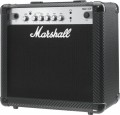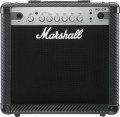Built-in effects provided in the combo amplifier. You can also achieve various effects with the help of external “gadgets”, however, such gadgets need to be searched for and connected separately, while built-in effects are available immediately and without unnecessary settings.
—
Overdrive. Distortion in the form of a characteristic electric guitar "buzz" at low frequencies and "howl" at high frequencies, a little softer than distortion. Popular, in particular, in hard rock.
—
Distortion. Sufficiently hard and sharp distortion, similar in sound to overdrive, but more intense and brighter. It is widely used in various styles of metal, and is also found in rock.
—
Reverb. An effect based on simulating multiple decaying echoes from each sound. Depending on the duration and intensity of repetitions, it can give the sound a different colour. Used as an artistic device; among other things, it can create the effect that the guitar sounds in a certain room (concert hall, room with stone walls, an open area in the mountains, etc.). Note that the reverberation can be adjusted both by individual parameters (intensity, echo duration, etc.), and by selecting a preset set of parameters (for example, “sharp sound in the room” or “soft sound in the hall”).
—
Tremolo. Tremolo is basically a trembling effect that res
...ults from small and quick fluctuations in the volume of each note. Sometimes this term means vibrato (see below) — to the point that the manufacturers of guitar amplifiers themselves mean the effect of vibrato by the tremolo effect, and vice versa. So the specifics of this effect in each case should be clarified separately. Anyway, the tremolo can be "fixed" or adjustable in depth (range of volume change) and speed (jitter frequency).
— Vibrato. Another effect of "jerking" sound, which is often confused with tremolo (see above) — to the point that both these terms are used as identical. However, this is not true; the difference lies in the fact that vibrato is carried out due to the rapid fluctuations of the note not in volume, but in frequency. A similar effect can be achieved on the guitar itself by "pulsating" the strings, but using the amplifier's built-in instrument is much more convenient in most cases.
— Chorus. An effect designed to simulate the choral sound of an instrument. To do this, the amplifier copies the sound of the guitar and plays several copies simultaneously with the original signal, slightly shifting them in time (about 20 – 30 ms with a constant change) and frequency. However it is impossible to achieve a full-fledged choral sound in this way, but the effect is quite original in itself.
— Delay. A specific type of reverb (see "Reverb") that has become widespread as a separate effect. Delay simulates a clear single echo from the sound being played; for this, the original signal is copied and reproduced with a certain time delay (at least 50 ms).
In addition to those described above, other effects can be found in modern guitar combo amplifiers, in particular:
— Flanger. The effect is reminiscent of the whistle of a jet engine; it is often compared to a plane taking off. It is created similarly to the Chorus described above, differs from it in a shorter delay time and the presence of feedback.
— echo. Another kind of reverb, similar to delay (see “Delay”). It differs in that in this case the echo is reproduced repeatedly.
— Octaver. An effect in which a copy of it is added to the signal, shifted by an octave or two.
— Wah wah. An effect that produces a characteristic "croak" sound.
